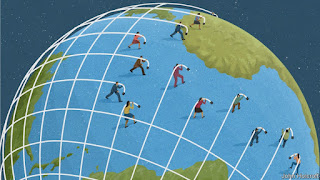The Re-Branding of Middle East Youth: Identities, Possibilities, Connectivities
It’s a good sign when you don’t use much of your carefully planned PowerPoint slides when interacting with the youth. Had a wonderful discussion with an engaged and critical group of Language students at the University of Jordan on new technologies, business communication and culture as well as with a significant number of youth who attended the Leaders of Tomorrow event at the King Hussain Cultural Centre organized around this topic. Granted, many seemed to come from a privileged background with impeccable English and an international exposure. This by no means discounts their perspective. In fact, given my experience in India and the fact that I’m a product of such privilege, I’m acutely aware of that thin line between belongingness and responsibility that the fortunate feel towards their immediate surrounding versus the feeling of affinity towards that of afar. It is much too easy to become civically disengaged from our context and I’d even argue that much of the youth, be it in Jordan or India or other such nations are unintentionally primed by the education system towards detachment (often through convent schooling and other postcolonial institutions that still serve as key places for good and cheap education). It takes a certain introspection to shift from ones monocultural perspective that is fostered within walls of privilege and group affinities. The notion of diasporas sweeten the deal with the hope that we still belong to a community, giving us that warm fuzzy feeling of placement and a legitimate way out from responsibility towards ones nation. It’s a double-edged sword really as this very same notion can foster strong ties, relationships, and connectivity that has been accelerated and enhanced through social media. We are not rational creatures by any means and much of our decisions are emotively and personally driven, leading a Jordanian entrepreneur in Amsterdam or an Indian born regional manager in Silicon Valley to establish their outsourcing hubs in their own home towns to be closer to family, friends and somehow feel that they’re not “sell outs” of their culture. Fighting the oreo image or the coconut label of being brown on the outside and white in the inside is hardly easy. We constantly hear about the “authentic” citizen, as if geographic situatedness in itself creates rootedness and a sense of nationalistic responsibility. Interestingly however, today it has become unfashionable to use the term “patriotism” when addressing this phenomenon, as it connotes a lemming-like behavior; the herd-like movement and choices that one is attributed to make when driven by this concept. However, this is stronger as ever and has manifested itself in business opportunities flowing back “home” through deliberate orchestrations within multinationals by migrants of all stripes and colors. The much touted brain circulation has been embraced over the brain drain fear as migrants flow with their ideas, connections, and opportunities across these cultures, creating bridges to new markets and new possibilities in one’s social and political life. What I sense from being in Amman and interacting with the youth here is that they’re at some interesting and undoubtedly challenging junctions right now: of wanting to get out and seek opportunities elsewhere and yet knowing somehow that this is their time of being here and capitalizing on the euphoric expectations that have emerged through the much hyped twitter revolution enveloping this region. That somehow, this is their time to reify this hype and make it tangible by leveraging on the hope and positive attitudes and investor-oriented mindset that much of the outside world has towards them. The youth in the Middle East have been re-branded. They know that; it’ now a matter of converting this brand into something that will be fruitful to them and their people. There is also a sense of more choices and making use of promising opportunities and yet, there is deep uncertainty and fear and lack of guidance in this virgin territory given that their comfort zone is to abide by plans that their parents and the government has for them. Being a leader of tomorrow out here would be a little easier if they had leaders of the past to guide them. The pressure is intense but fortunately they have each other and as long as they’re communicating, interacting and sharing, it has to get easier somehow…




Comments
Post a Comment